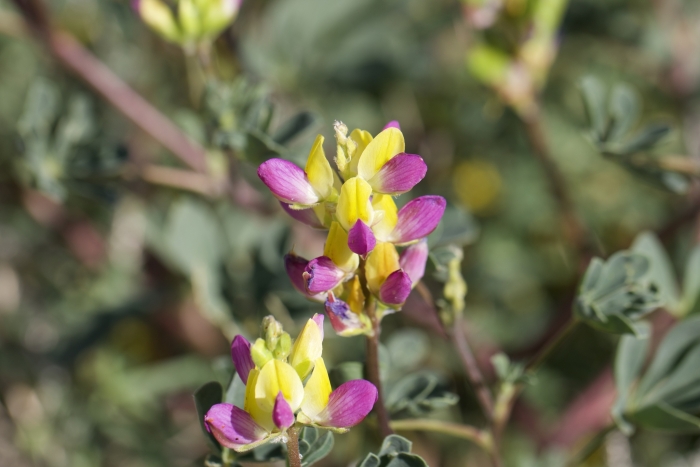Harlequin Annual Lupine
(Lupinus stiversii)
Harlequin Annual Lupine (Lupinus stiversii)
/
/

© Arvel Hernandez
CC BY-SA 4.0
Image By:
© Arvel Hernandez
Recorded By:
Copyright:
CC BY-SA 4.0
Copyright Notice:
Photo by: © Arvel Hernandez | License Type: CC BY-SA 4.0 | License URL: http://creativecommons.org/licenses/by-sa/4.0/ | Uploader: arvel | Publisher: iNaturalist |




















Estimated Native Range
Summary
Lupinus stiversii, commonly known as Harlequin Annual Lupine, is an annual herb endemic to California, specifically to the Sierra Nevada, Transverse Ranges, and Santa Lucia Mountains. It can grow up to 20 inches tall and is characterized by its hairy stems and palmate leaves, each with 7 leaflets. The plant produces striking pink flowers with yellow banners that bloom in dense arrays, typically in the spring and early summer. These are followed by legume pods that contain up to 5 seeds each. Harlequin Annual Lupine is adapted to open, dry habitats such as chaparral, forest clearings, and grasslands.
Harlequin Annual Lupine is appreciated for its vibrant flowers which add a splash of color to wildflower gardens and naturalized areas. It is often used in restoration projects due to its ability to fix nitrogen in the soil, which improves soil fertility for other plants. This lupine prefers full sun to partial shade and requires well-drained soils. It is drought-tolerant once established, making it suitable for xeriscaping. While generally easy to maintain, it can be susceptible to fungal diseases in wet conditions. There are no widely available garden cultivars of this species, and it is primarily valued for its ecological role and natural beauty in wild settings. Gardeners should be aware that it may self-seed and spread if conditions are favorable.CC BY-SA 4.0
Harlequin Annual Lupine is appreciated for its vibrant flowers which add a splash of color to wildflower gardens and naturalized areas. It is often used in restoration projects due to its ability to fix nitrogen in the soil, which improves soil fertility for other plants. This lupine prefers full sun to partial shade and requires well-drained soils. It is drought-tolerant once established, making it suitable for xeriscaping. While generally easy to maintain, it can be susceptible to fungal diseases in wet conditions. There are no widely available garden cultivars of this species, and it is primarily valued for its ecological role and natural beauty in wild settings. Gardeners should be aware that it may self-seed and spread if conditions are favorable.CC BY-SA 4.0
Plant Description
- Plant Type: Herb
- Height: 1-2 feet
- Width: 1-1 feet
- Growth Rate: Slow, Moderate
- Flower Color: Blue, Pink, Purple, White, Yellow
- Flowering Season: Spring, Summer
- Leaf Retention:
Growth Requirements
- Sun: Full Sun
- Water: Low
- Drainage: Fast
Common Uses
Bee Garden, Butterfly Garden, Low Maintenance
Natural Habitat
Native to chaparral, forest clearings, and grasslands in California
Other Names
Common Names: Harlequin Lupine, Stivers’ Lupine
Scientific Names: , Lupinus stiversii,
GBIF Accepted Name: